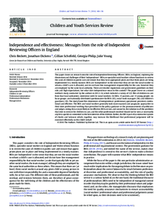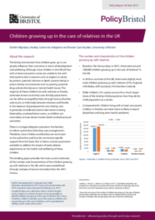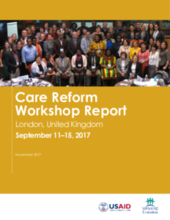Displaying 871 - 880 of 1177
This chapter discusses findings from a qualitative study that investigated the experiences of disabled children living in out-of-home care in th UK.
This video from the BBC exposes some of the mental health struggles that many children in care experience in the UK, sharing the story of one particular young man, Callum, who was placed in care and engaged in self-harming behavior.
This article, written by Professor Andy Bilson and published in the UK's Telegraph, highlights a new campaign launched by Hope and Homes for Children called 'End the Silence.' The campaign is designed to raise awareness on the effects of institutionalization on children, and to raise funding for the organization's deinstitionalization efforts ("closing orphanages and finding loving, family based care for children.")
The paper draws on a mixed methods study the role and effectiveness of Independent Reviewing Officers in England.
This policy brief provides the most current estimates of the number and characteristics of the children growing up with relatives in the UK, which were established through analyses of secure microdata from the 2011 Census, highlighting analysis and policy implications of those findings.
This report outlines the MEASURE Evaluation workshop sessions and provides highlights, key discussion points, and action items.
Young unaccompanied asylum seekers have been portrayed as vulnerable, resilient or both. Those granted residency in Europe are offered support by health and social care systems, but once they leave the care system to make independent lives, what part can these services play?
This year’s lecture will see academics and research participants discuss how they have worked together using theatre practices to explore care experience.
The Verbatim Formula is an applied performance research project which is currently working with looked after children and young people.
This video from the BBC shares stories from some mixed racial, ethnic, and religious foster care families.



